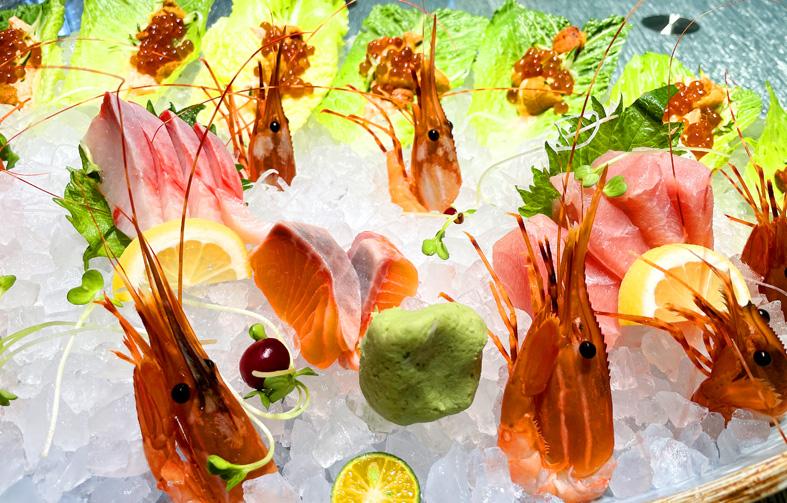Nutritionists and doctors weighed in on the merits of eating fish following a salmon sushi craze triggered by a restaurant chain’s publicity stunt.
More than 200 people have changed their names after sushi chain Akindo Sushiro offered free meals on Wednesday and Thursday to people named “salmon” (guiyu, 鮭魚), while those with homophonic names were eligible for other deals.
Salmon is a healthy fish to eat with a wide variety of health benefits, Tainan Municipal Hospital said in a statement.

Photo copied by Chen Chien-chih, Taipei Times
Salmon is rich in nutritional content, including proteins, vitamins, minerals and fatty acids, including the particularly beneficial omega-3 fatty acid, hospital nutritionist Chang Li-chuan (張麗娟) said.
It has anti-inflammatory and anti-allergic properties, reduces clot formation and depression, and helps prevent memory loss, she said.
Omega-3 fatty acids are found in deep-sea fish, in addition to salmon, although people should limit fish consumption to about two or three times a week to limit ingestion of heavy metals, she added.
It is recommended to alternate consuming large fish with small ones, which contain lower concentrations of heavy metals, such as mackerel and pacific saury, while vegetarians can obtain omega-3 fats from chia seeds, flax seeds and algae, she said.
Daily servings of vegetables and milk are also an indispensable part of a healthy diet for vitamins B, C and E, as well as calcium, she said.
B vitamins help metabolize the amino acid homocysteine, while vitamins C and E are antioxidants, Chang said.
Nutritional density in meals is more important than quantity, she said, adding that people should eat until they feel about 70 to 80 percent full.
Medical research suggests that the risk of developing rheumatism could be reduced by 35 percent by eating 100g of fatty fish such as salmon each week, said Cheng Chieh-fu (鄭傑夫), a rheumatology and immunology specialist at the hospital.
The Mediterranean diet, consisting of vegetables, fruit, whole grains, beans, olive oil, nuts and fish, is considered healthy by many doctors, he said.
Eating fish two or three times per week should be supplemented with chicken, eggs and dairy, and the daily intake of omega-3 fats should be about 0.21 grams, he said.
Asia University Hospital hepatobiliary and gastroenterology doctor Tseng Sheng-en (曾晟恩) said that people with cirrhosis, diabetes or compromised immune systems should not eat raw fish.
While diners are unlikely to get sick at a good sushi restaurant, less reputable establishments might not be as careful with sanitation and hygiene, he said.
“Food poisoning from raw fish is often seen at gastroenterology clinics and emergency rooms,” he said.
Consuming large amounts of sushi, which contains rice, could lead to surges in a person’s blood sugar level, a concern for diabetics, he added.
Additional reporting by Wang Chun-chung

Eight restaurants in Taiwan yesterday secured a one-star rating from the Michelin Guide Taiwan for the first time, while three one-star restaurants from last year’s edition were promoted to two stars. Forty-three restaurants were awarded one star this year, including 34 in Taipei, five in Taichung and four in Kaohsiung. Hosu (好嶼), Chuan Ya (川雅), Sushi Kajin (鮨嘉仁), aMaze (心宴), La Vie by Thomas Buhner, Yuan Yi (元一) and Frassi in Taipei and Front House (方蒔) in Kaohsiung received a one-star rating for the first time. Hosu is known for innovative Taiwanese dishes, while Chuan Ya serves Sichuan cuisine and aMaze specializes

STATS: Taiwan’s average life expectancy of 80.77 years was lower than that of Japan, Singapore and South Korea, but higher than in China, Malaysia and Indonesia Taiwan’s average life expectancy last year increased to 80.77 years, but was still not back to its pre-COVID-19 pandemic peak of 81.32 years in 2020, the Ministry of the Interior said yesterday. The average life expectancy last year increased the 0.54 years from 2023, the ministry said in a statement. For men and women, the average life expectancy last year was 77.42 years and 84.30 years respectively, up 0.48 years and 0.56 years from the previous year. Taiwan’s average life expectancy peaked at 81.32 years in 2020, as the nation was relatively unaffected by the pandemic that year. The metric

Taiwan High Speed Rail Corp. (THSRC) plans to ease strained capacity during peak hours by introducing new fare rules restricting passengers traveling without reserved seats in 2026, company Chairman Shih Che (史哲) said Wednesday. THSRC needs to tackle its capacity issue because there have been several occasions where passengers holding tickets with reserved seats did not make it onto their train in stations packed with individuals traveling without a reserved seat, Shih told reporters in a joint interview in Taipei. Non-reserved seats allow travelers maximum flexibility, but it has led to issues relating to quality of service and safety concerns, especially during

A magnitude 5.1 earthquake struck Chiayi County at 4:37pm today, the Central Weather Administration (CWA) said. The hypocenter was 36.3km southeast of Chiayi County Hall at a depth of 10.4km, CWA data showed. There were no immediate reports of damage resulting from the quake. The intensity of the quake, which gauges the actual effect of a seismic event, measured 4 in Chiayi County, Tainan and Kaohsiung on Taiwan's seven-tier intensity scale, the data showed. The quake had an intensity of 3 in Chiayi City and Yunlin County, while it was measured as 2 in Pingtung, Taitung, Hualien, Changhua, Nantou and Penghu counties, the data